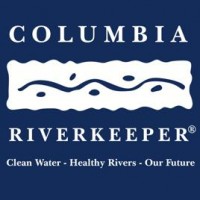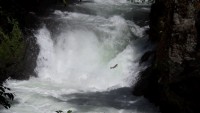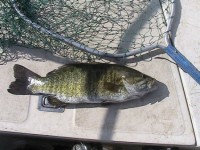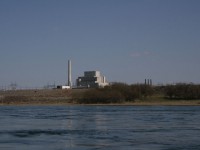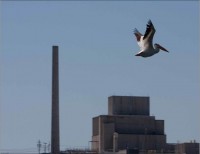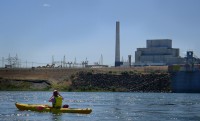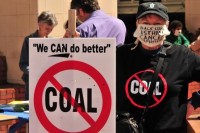Blog post by Christina Skirvin, Riverkeeper's Program Administrator—
It's been a busy 2012 here at Riverkeeper. Thanks to all who have donated, volunteered, and rallied alongside us in the fight for our right to clean water and to protect the mighty Columbia. As we head into 2013, it’s time to reflect on some of this year's major accomplishments, events, and milestones. Join us from December 27th until the New Year as we share a different 2012 highlight each day.
Cheers to the New Year!
#1: Salmon Return to the Free-Flowing White Salmon River
Once abundant in the White Salmon River, salmon and steelhead passage had been blocked by Condit Dam for almost 100 years until dynamite blasted a hole in the bottom of the dam in October 2011. The final remnants of Condit Dam were finally removed by PacifiCorp this September. The White Salmon River runs free - and the salmon and steelhead have returned! Children now get the thrill of watching salmon and steelhead power up waterfalls. Whitewater enthusiasts can enjoy a new stretch of the river. And Native Americans will fish from the falls like their ancestors did for thousands of years as the natural way of the river returns.
Brett VandenHeuvel’s, Riverkeeper Executive Director, was one of the first people lucky enough to paddle the river after it was opened to the public this fall. Read his first-hand account.
Donate to Riverkeeper today to help support victories like this for our watershed, fish, wildlife, and communities.
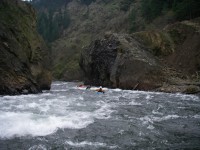
#2: Columbia River fish contain toxic levels far-exceeding EPA safe levels for consumption
This year Riverkeeper began a compelling new study, Is Your Fish Toxic?, that takes a close look at toxics in Columbia River fish and the individuals and communities reliant on these fish. In our study, we met fishermen on the River and tested fish bound for the dinner table. Three fish were tested, including a bass near Hood River, a sturgeon near Astoria, and a sucker in Portland. Meet the fishermen who participated in the study.
We released the results of our study in October, which revealed shocking levels of toxic pollution. We detected PCB (polychlorinated biphenyl) concentrations 27,000% and mercury levels 300% above Environmental Protection Agency’s (EPA) safe levels for consumption as well as heavy metals and toxic flame retardants (PBDEs). PBDEs are known endocrine disruptors that can increase the risk of cancer and disrupt hormone function. Learn more about the toxics found.
[youtube]http://www.youtube.com/watch?v=MZHax1Mz_gA&list=UUdrVTZTsccPjgYX6V2YZCcg&index=5[/youtube]
People have the right to eat fish from the Columbia without the fear of getting sick.
Help us study more fish, tell more stories, and protect our right to toxic-free water and fish by donating today. Contact Riverkeeper’s Water Quality Director, Lorri Epstein, to get involved in the study (lorri@columbiariverkeeper.org).
#3: Hanford: Radioactive Pollution Concerns Intensify
The Hanford site distinguish ed itself in 2012, yet again, as one of the biggest threats to the Columbia River and the life dependent on it:
- In early 2012, lead engineers on the Waste Treatment Plant acted as whistleblowers, raising serious questions about the efficacy and integrity of plans to immobilize highly radioactive waste into glass form.
- The U.S. Department of Energy (DOE) revealed that one of Hanford’s double-shelled tanks had begun to leak this fall.
- This December DOE released its final Tank Closure/Waste Management Environmental Impact Statement, which leaves the door open for more nuclear waste shipments to Hanford.
Clean-up plans at Hanford, the Western Hemisphere's most radioactively polluted site, will pose a serious challenge for decades to come. The developments of 2012 reminded the entire region of the challenges we face.
In October, Riverkeeper was fortunate enough to add a new staff member solely dedicated to Hanford. As Riverkeeper’s Hanford Coordinator, Theresa Labriola will work to address the extremely difficult nuclear and chemical contamination problem at Hanford. But, we need your support to do this work. Contact Theresa directly (theresa@columbiariverkeeper.org) to get involved.
Photo by Matt McCormick
#4: Legal Victory Paves the Way for Clatsop County to Reject LNG Pipeline
In October 2012, after years of appeals by Oregon LNG, the Oregon Court of Appeals ruled in our favor that Clatsop County had the right to revoke its liquefied natural gas (LNG) pipeline approval. Learn how we arrived at the October 2012 victory. The unanimous court decision marks a turning point for Oregon LNG. Without a pipeline through Clatsop County, Oregon LNG has no way to send natural gas to its export terminal proposed in Warrenton, Oregon. And the court decision is only one of many hurdles that Oregon LNG still faces. What’s next? Oregon LNG continues its attempt to block a County vote by appealing to the Oregon Supreme Court. Riverkeeper is asking the Supreme Court to not hear this appeal and allow the County to finalize its vote. When they finally get a chance to vote, we’re hopeful that Clatsop County will deny the LNG pipeline.
Riverkeeper is one of only a handful of non-profit organizations in Oregon that takes on complex land use challenges like the Oregon LNG pipeline case, and we know first-hand how critical these cases are to protecting the Columbia and the communities, families, fish and wildlife dependent on it. We will continue our legal and organizing work to stop the Oregon LNG proposal and Washington Expansion Project in 2013, but we need your help. Please donate and get involved today to help ensure these proposed LNG projects go the same direction as NorthernStar’s Bradwood LNG proposal: nowhere.
#5: Robert F. Kennedy, Jr. Rally against Exporting Coal through Pacific Northwest to Asia
On May 7th, hundreds of concerned citizens gathered in Portland’s Pioneer Courthouse Square, alongside Waterkeeper Alliance President, Robert F. Kennedy, Jr., in one of Oregon’s largest demonstrations against coal exports. Riverkeeper’s Staff Attorney, Lauren Goldberg, emceed the rally and introduced Mr. Kennedy. Kennedy stated, “coal is poison, do not let it into your communities.” Political leaders and members of Power Past Coal gave impassioned speeches about the extreme dangers to our health, communities, and environment if these coal export proposals are given the green light. In 2012, Riverkeeper used our legal skills, community organizing, and on-the-river knowledge to thwart dirty coal - so far. We will continue to work hard and depend on your support in 2013 to stop coal export. Read more
Check out our photo & video galleries from the May 7th rally!
